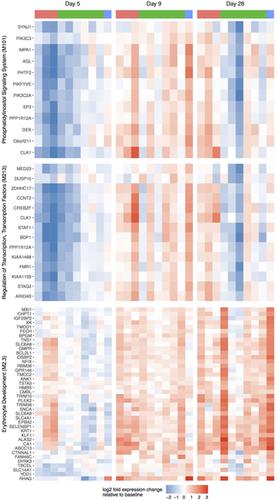PLOS ONE ( IF 3.7 ) Pub Date : 2018-06-19 , DOI: 10.1371/journal.pone.0199392 Julian Rothen , Carl Murie , Jason Carnes , Atashi Anupama , Salim Abdulla , Mwajuma Chemba , Maxmillian Mpina , Marcel Tanner , B. Kim Lee Sim , Stephen L. Hoffman , Raphael Gottardo , Claudia Daubenberger , Ken Stuart

|
Malaria continues to be one of mankind’s most devastating diseases despite the many and varied efforts to combat it. Indispensable for malaria elimination and eventual eradication is the development of effective vaccines. Controlled human malaria infection (CHMI) is an invaluable tool for vaccine efficacy assessment and investigation of early immunological and molecular responses against Plasmodium falciparum infection. Here, we investigated gene expression changes following CHMI using RNA-Seq. Peripheral blood samples were collected in Bagamoyo, Tanzania, from ten adults who were injected intradermally (ID) with 2.5x104 aseptic, purified, cryopreserved P. falciparum sporozoites (Sanaria® PfSPZ Challenge). A total of 2,758 genes were identified as differentially expressed following CHMI. Transcriptional changes were most pronounced on day 5 after inoculation, during the clinically silent liver phase. A secondary analysis, grouping the volunteers according to their prepatent period duration, identified 265 genes whose expression levels were linked to time of blood stage parasitemia detection. Gene modules associated with these 265 genes were linked to regulation of transcription, cell cycle, phosphatidylinositol signaling and erythrocyte development. Our study showed that in malaria pre-exposed volunteers, parasite prepatent period in each individual is linked to magnitude and timing of early gene expression changes after ID CHMI.
中文翻译:

疟疾预暴露的志愿者中受控的人类疟疾感染后全血转录组的变化与寄生虫的预备期有关
尽管为抗击疟疾付出了许多不同的努力,但疟疾仍然是人类最具破坏力的疾病之一。消除疟疾和最终根除必不可少的是开发有效的疫苗。受控的人类疟疾感染(CHMI)是评估疫苗功效以及研究针对恶性疟原虫感染的早期免疫和分子应答的宝贵工具。在这里,我们调查了使用RNA序列的CHMI后基因表达的变化。外周血样品收集在巴加莫约,坦桑尼亚,从谁用2.5×10皮内(ID)注射10名成人4无菌的,纯化,冷冻保存P。恶性疟子孢子(Sanaria®PfSPZ挑战)。CHMI后共鉴定出2758个差异表达基因。在临床无症状的肝阶段,接种后第5天转录变化最为明显。二次分析根据志愿者的生存期长短对志愿者进行了分组,确定了265个基因的表达水平与血阶段寄生虫病的检测时间相关。与这265个基因相关的基因模块与转录,细胞周期,磷脂酰肌醇信号传导和红细胞发育的调节有关。我们的研究表明,在疟疾预暴露的志愿者中,每个个体的寄生虫孕育期与ID CHMI后早期基因表达改变的程度和时间有关。


























 京公网安备 11010802027423号
京公网安备 11010802027423号